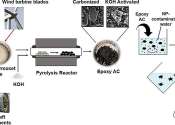A bottle is a rigid container with a neck that is narrower than the body and a "mouth". By contrast, a jar has a relatively large mouth or opening. Bottles are often made of glass, clay, plastic, aluminum or other impervious materials, and typically used to store liquids such as water, milk, soft drinks, beer, wine, cooking oil, medicine, shampoo, ink, and chemicals. A device applied in the bottling line to seal the mouth of a bottle is termed an external bottle cap, closure, or internal stopper. A bottle can also be sealed by a conductive "innerseal" by using induction sealing.
The bottle has developed over millennia of use, with some of the earliest examples appearing in China, Phoenicia, Rome and Crete. The Chinese used bottles to store liquids. Bottles are often recycled according to the SPI recycling code for the material. Some regions have a legally mandated deposit which is refunded after returning the bottle to the retailer.









